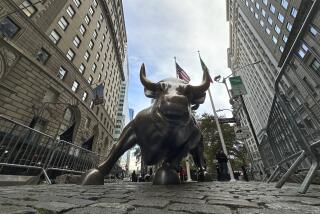Dow Index Falls Below 11,000
Stocks dropped Wednesday, extending investors’ losses for the third straight session and pushing the Dow Jones industrial average below 11,000 for the first time since March 9.
The Dow has lost more than 316 points this week. The sell-off has also wiped out the Nasdaq composite index’s gains for the year and put the Standard & Poor’s 500 index less than 8 points away from its Dec. 31 close.
With little economic data or corporate news to move stocks, traders were left to decide whether the week’s tumble was a buying opportunity or a harbinger of worse days ahead. Stocks spent most the day higher as oil prices fell, but the market turned negative in late afternoon.
Trading volume remained well below the peak levels of May, which some investors said was a sign of more losses to come.
“When we have big down days on big volume, that’s a sign of capitulation,” said Chris Johnson, manager of quantitative analysis at Schaeffer’s Investment Research in Cincinnati. “Monday and Tuesday, we saw selling, but it wasn’t the type of volume we like to see for short-term buying opportunities.... All the sellers aren’t out of this market yet.”
The Dow fell 71.24 points, or 0.7%, to 10,930.90.
Broader stock indicators also declined. The S&P; 500 index fell 7.70 points, or 0.6%, to 1,256.15, and the Nasdaq index fell 10.98 points, or 0.5%, to 2,151.80.
Declining issues led advancers by about 3 to 2 on the New York Stock Exchange.
The Dow has fallen 6.1% since reaching a six-year high May 10, although it still is up 2% year to date.
The S&P; 500 index also still is positive for the year, up 0.6%.
Measured from their recent highs, the S&P; 500 is down 5.2%, the Nasdaq composite is off 9.2% and the Russell 2,000 small-stock index is down 9.6%.
A normal “correction” in a bull market shaves 10% to 15% from key indexes before they stabilize.
Yields on U.S. Treasury bonds rose Wednesday, with the 10-year T-note climbing to 5.02% from 5% on Tuesday.
Equity investors, worried about the Federal Reserve’s interest rate policy, have sent stocks on a roller-coaster ride the last four weeks, driving them down from near-record highs, then building them up again.
“We’re in one of these data-driven, revolving-door kind of periods,” said Philip S. Dow, managing director of equity strategy at RBC Dain Rauscher in Minneapolis. “We’re going to get some more volatility before we get on a clearer path to what really is neutral at the Fed.”
In other market highlights:
* Energy stocks were among Wall Street’s biggest losers as crude oil futures in New York fell to $70.82 a barrel, down $1.68 for the day.
Exxon Mobil dropped $1.58 to $58.82, Occidental Petroleum slid $3.07 to $94.72 and Suncor Energy lost $4.21 to $75.23.
An index of 13 major oil stocks fell 2.9% to its lowest since March 23, although it still is up 7% year to date.
* The U.S. market’s decline pulled Latin American stocks sharply lower, deepening losses in those markets.
Brazil’s Bovespa stock index plunged 3.5% and Mexico’s IPC index slid 2.1%. Both indexes are down 16% from their record highs reached May 9.
Asian markets had tumbled before U.S. trading began. Japan’s Nikkei 225 index fell 1.9% to 15,096, its lowest level since November. The South Korean market sank 2.7% and India’s Sensex index slumped 2%.
* Chemical companies dropped after a Deutsche Bank downgrade of six names in the sector, including Dow Chemical, which fell 50 cents to $39.08. DuPont, which was also downgraded, fell $1.08 to $41.09.
* Shares of furniture maker La-Z-Boy fell $1.84, or 13%, to $12.25 after the company swung to a fiscal fourth-quarter loss and issued a first-quarter outlook that fell below Wall Street expectations. Raymond James downgraded the company to “outperform” from “strong buy.”
* Target rallied $1.30 to $48.90. Target’s full-year earnings per share should increase in the mid-teen percentage range, boosted by growth in its stores and credit card business as well as continued stock buybacks, the company said in a regulatory filing.
Nordstrom rose 66 cents to $36.96. Dillard’s gained 49 cents to $29.06.
* Microsoft lost 9 cents to $22.04, its lowest closing price since 2002.
More to Read
Inside the business of entertainment
The Wide Shot brings you news, analysis and insights on everything from streaming wars to production — and what it all means for the future.
You may occasionally receive promotional content from the Los Angeles Times.










